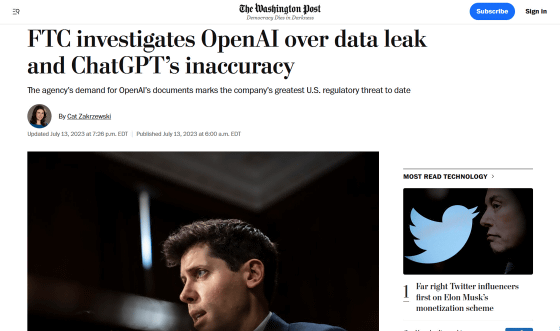US authorities launch OpenAI investigation as ChatGPT generated ``disgraceful and misleading false descriptions about individuals''

ChatGPT, an AI chatbot developed by OpenAI, has attracted a lot of attention since its release and is now a tool used by users all over the world, but sometimes it generates false or unfounded content called ``hallucination''. pointed out. Newly, the US Federal Trade Commission (FTC) , which monitors unfair competition and deceptive behavior related to commercial activities in the United States, has accused OpenAI of harming consumers due to misinformation generated by ChatGPT. It is reported that an investigation has been launched.
The FTC investigates OpenAI over data leak and ChatGPT's inaccuracy - The Washington Post
https://www.washingtonpost.com/technology/2023/07/13/ftc-openai-chatgpt-sam-altman-lina-khan/

US FTC opens investigation into OpenAI over misleading statements - document | Reuters
https://www.reuters.com/technology/us-ftc-opens-investigation-into-openai-washington-post-2023-07-13/
ChatGPT under investigation by the FTC about 'risks of harm to consumers' : NPR
https://www.npr.org/2023/07/13/1187532997/ftc-investigating-chatgpt-over-potential-consumer-harm
Chasing defamatory hallucinations, FTC opens investigation into OpenAI | Ars Technica
https://arstechnica.com/information-technology/2023/07/chasing-defamatory-hallucinations-ftc-opens-investigation-into-openai/
According to a 20-page (PDF file) document obtained by the Washington Post, a major daily newspaper, the FTC has asked OpenAI to hand over a record of ``how to address the risks associated with AI models.'' He said he did.
The information OpenAI was asked to surrender included not only AI risk policies and procedures, but also financial records, data on the training of large-scale language models, survey results to assess how well consumers understand AI, It also includes records of complaints received from people. The FTC said it would investigate 'whether you engaged in unfair or deceptive practices related to the risk of harm to consumers, including reputational damage.'
False or unfounded sentences generated by AI are called ' hallucinations ', and AI can explain inaccurate information so bluntly and realistically that consumers may believe the misinformation. considered dangerous. You can understand why AI generates random sentences by reading the following article.
ChatGPT can have high-performance dialogue, but why do you sometimes give random answers? -GIGAZINE

There have already been several reports of ``ChatGPT outputting false descriptions about individuals''. Mark Walters, a radio personality from Georgia, USA, was described as ``a person who embezzled funds from the Second Amendment Foundation (SAF)'' when a journalist summarized the complaint on ChatGPT. Walters never actually belonged to the SAF.
In response to this situation, Mr. Walters sued OpenAI for being defamed by false content. Walters' lawyer argues, 'Although AI research and development is valuable, it is irresponsible to release a system that is known to make up 'facts' about people.'
ChatGPT sued for defamation for false output - GIGAZINE

Also, law professor Jonathan Turley said that when a lawyer asked ChatGPT to generate a ``list of legal scholars who have sexually harassed'', his name was listed even though he did not remember it at all. . According to ChatGPT, ``Mr. Turley sexually harassed when he went on a class trip to Alaska with his students,'' citing an article in the Washington Post, but the article itself presented by ChatGPT as a source of information does not exist in the first place. was.
In this way, concerns about consumer AI, including ChatGPT, led the FTC to investigate OpenAI, a top runner in the AI field. The FTC is also asking for records of breaches in which a bug in ChatGPT allowed users to view someone else's chat history and payment information.
OpenAI CEO Sam Altman said of the leaked FTC document requesting data delivery: ``It's very disappointing and doesn't help build trust. is very important to us, and we are confident that OpenAI is compliant with the law, and of course we will work with the FTC.'
it is very disappointing to see the FTC's request start with a leak and does not help build trust.
— Sam Altman (@sama) July 13, 2023
that said, it's super important to us that out technology is safe and pro-consumer, and we are confident we follow the law. Of course we will work with the FTC.
The FTC investigation is another challenge facing OpenAI, but some lawmakers are also taking a hard look at the FTC. Republican Senator Dan Bishop told FTC Chairman Rina Kern during a hearing on Thursday, July 13, that the FTC has no legal authority to conduct such an investigation into OpenAI. I asked if there was. Bishop points out that defamation and defamation are generally prosecuted under state law, and the FTC may not have the authority to investigate defamation.
Khan responded that while defamation and defamation are certainly not the focus of FTC enforcement, the misuse of personal information in AI training could be a form of fraudulent or deceptive conduct under FTC law. , claimed to fall within the scope of consumer protection. 'We are focused on'whether there is serious harm to people'.There are different types of damage in this case,' he said.
The FTC has long sent the message that it is 'ready to take action against AI,' and in February 2023, it warned about the hype of AI products in a blog post. In a speech at Harvard Law School in April, Samuel Levin, the FTC's director of consumer protection, said, 'The FTC welcomes innovation, but innovation is not a license to be reckless.' No. We stand ready to use all tools, including enforcement, to challenge harmful practices in the AI space.'
What are the pitfalls of AI product advertising pointed out by the FTC? -GIGAZINE

The US lags behind Europe in AI regulation, but some lawmakers are recognizing the need to regulate the burgeoning AI. Democratic Rep. Ted Liew has proposed an AI commission to study the impact of technology, and Democratic Senator Chuck Schumer, who serves as Senate Majority Leader, is working to create a bill to regulate AI. It is reported that
Related Posts:
in Software, Web Service, Posted by log1h_ik






